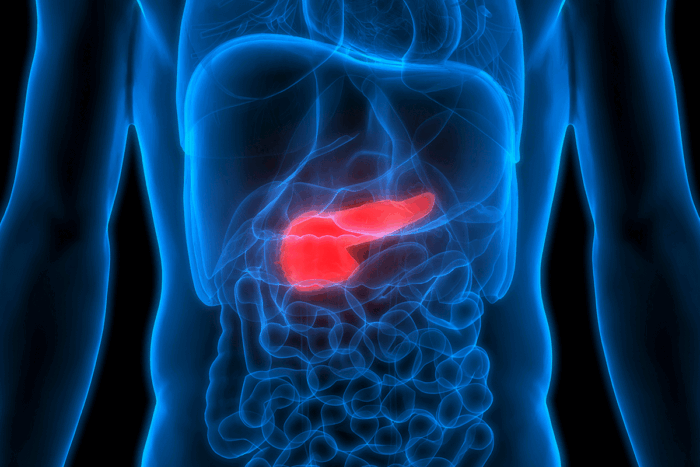Pancreatic cancer research, clinical trials supported with $10.9 million NCI grant
Researchers receive prestigious SPORE grant for pancreatic cancer
 Getty Images
Getty ImagesResearchers at Washington University School of Medicine in St. Louis have received an NCI grant that will provide about $10.9 million to research programs for the development of new therapies for pancreatic ductal adenocarcinoma, the deadliest form of pancreatic cancer.
Researchers at Washington University School of Medicine in St. Louis have received a prestigious Specialized Programs of Research Excellence (SPORE) grant from the National Cancer Institute (NCI) of the National Institutes of Health (NIH) to support research and clinical trials aimed at improving therapies for pancreatic cancer.
The five-year grant will provide about $10.9 million to research programs for the development of new therapies for pancreatic ductal adenocarcinoma, the deadliest form of pancreatic cancer. Fewer than 10% of patients with this cancer survive longer than five years after diagnosis.
The SPORE is co-led by David G. DeNardo, PhD, a professor of medicine; Ryan C. Fields, MD, the Kim and Tim Eberlein Distinguished Professor and chief of the Section of Surgical Oncology in the Department of Surgery; and William Hawkins, MD, a professor of surgery and chief of the Section of Hepatobiliary-Pancreatic and Gastrointestinal Surgery.
“We are hopeful we can improve the outcomes for patients with pancreatic cancer with key support from this grant,” said principal investigator DeNardo, a research member of Siteman Cancer Center, based at Barnes-Jewish Hospital and Washington University School of Medicine. “The new strategies we will investigate are very thoughtful about the immunology and stromal biology of these tumors.”
The funding will support three major research projects: One is aimed at a strategy to make this form of pancreatic cancer sensitive to immunotherapy; a second investigates ways to make the cancer respond to vaccines that target specific antigens on the tumor; and a third will explore an anti-inflammatory compound that has the potential to make pancreatic cancer more vulnerable to chemotherapy.
“In recent years, we have made some small progress in improving the survival rate for patients with this cancer, but we hope for much more,” Hawkins said. “The science behind these latest innovations in pancreatic cancer therapy is promising. We look forward to bringing these innovations to our patients through several new clinical trials.”
The new grant also provides funding for resources supporting all of these research initiatives, including a biospecimen core; a biostatistics and bioinformatics core; an administrative core; and programs for innovative research and career development to recruit and mentor early-career investigators focused on understanding and treating pancreatic cancer.
In one clinical trial, the researchers will investigate therapeutic strategies that block cells that suppress the immune system from attacking the tumor. An immunosuppressive environment prevents T cells from being able to find and kill the cancer cells. Preclinical research has shown that reprogramming these immunosuppressive cells improves T cell response. If activated T cells are able to infiltrate the tumor, this may make pancreatic cancer responsive to immune checkpoint inhibitors that further boost the function of anti-tumor T cells. This project is led by DeNardo and Katrina Pedersen, MD, an associate professor of medicine.
A second clinical trial will optimize anticancer vaccines to treat pancreatic ductal adenocarcinoma and seek to understand the ways tumors develop resistance to such vaccines. This type of vaccine can help train the immune system to attack tumors that produce abnormal proteins that are unique to the tumor. Zeroing in on those proteins would allow the T cells to specifically attack the cancer cells. This work is led by Hawkins; William Gillanders, MD, a professor of surgery; and Robert Schreiber, PhD, the Andrew M. and Jane M. Bursky Distinguished Professor.
In a third clinical trial, researchers will investigate a compound, called ATI-450, that inhibits a molecule, called MK2, that is critical in allowing pancreatic tumor cells to survive chemotherapy. Preclinical studies in mice have shown that combining the compound with FOLFIRINOX — a combination of four generic cancer drugs that together make up the front-line chemotherapy for pancreatic cancer — makes the cancer cells more vulnerable to the chemo. This project is led by Kian-Huat Lim, MD, PhD, an associate professor of medicine; and Gregory Beatty, PhD, of the University of Pennsylvania.
“This chemotherapy has toxic side effects and typically only works for about six months,” said Lim, who treats patients at Siteman. “We plan to investigate this compound in combination with chemotherapy in patients with stage 4 pancreatic cancer. Not only do we see in mouse models that the compound makes the chemotherapy more effective, there is also evidence that it reduces some of the intestinal toxicity that is common with FOLFIRINOX. We are hopeful we can achieve two goals with this combination therapy: more effective and less toxic treatment.”
Added Hawkins: “We are grateful to our patients, many of whom choose to participate in clinical trials to help others and to have an opportunity to try new and innovative therapies. There is strong science behind all of these trials, and we’re hopeful we will be able to improve outcomes for our patients.”







